Criminal Background Check for Apartment Rental: A Complete Guide
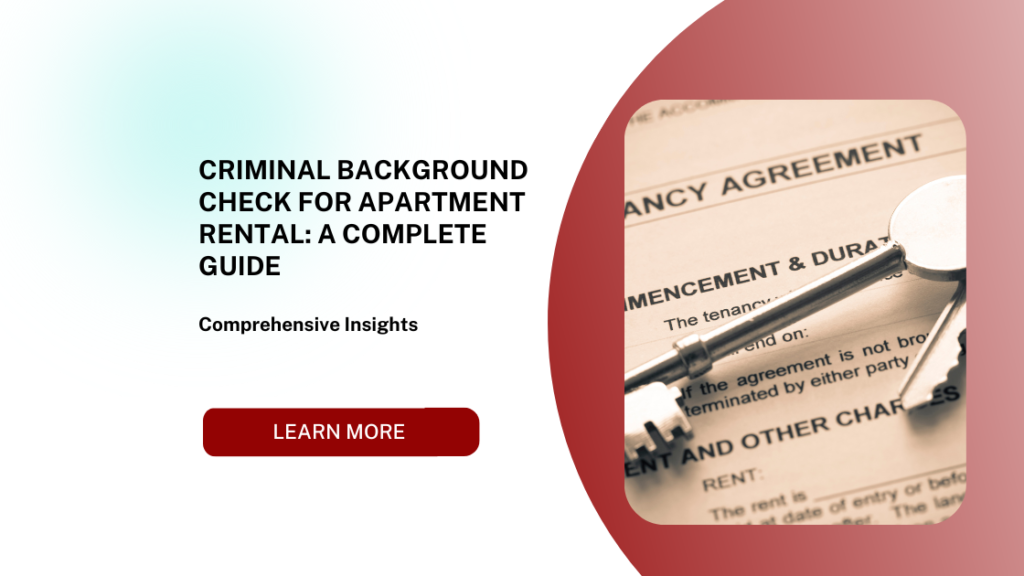
Introduction and Overview of Criminal Background Checks for Apartment Rentals
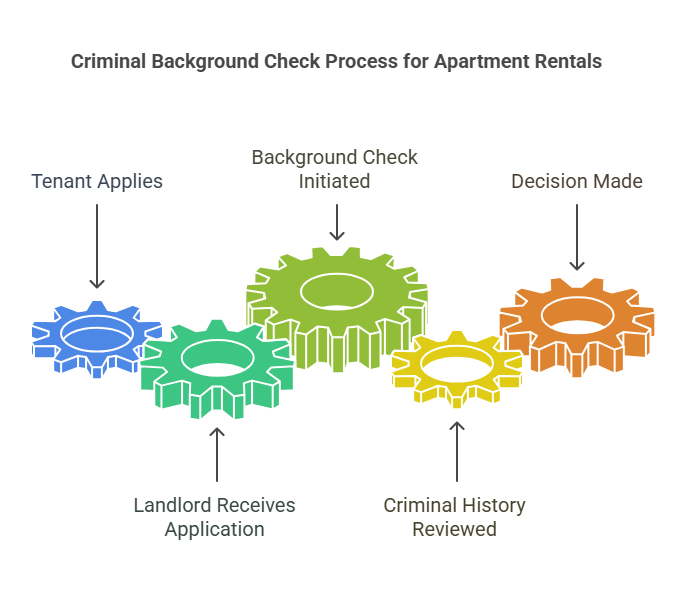
A criminal background check for apartment rental is a crucial process that landlords and property managers use to assess potential tenants. This type of background check helps ensure that the applicant does not have a history of criminal behavior that could put the safety of other tenants, the property, or the landlord at risk. By reviewing a prospective tenant’s criminal history, landlords can make more informed decisions about who they rent to.
A criminal background check typically involves reviewing an applicant’s criminal record for any felonies, misdemeanors, or other criminal activity. The results help landlords determine whether an applicant’s past criminal behavior might present a risk to the property or the community. While conducting a criminal background check is not required by law, it has become a common and highly recommended practice for property owners looking to protect their investments and ensure the safety of all parties involved.
Why Criminal Background Checks are Important for Landlords
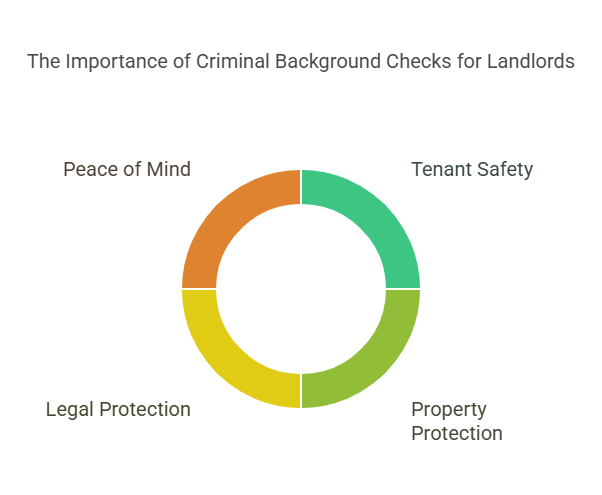
Criminal background checks are essential for landlords and property managers for several reasons:
- Tenant Safety: The primary concern for landlords is the safety of their tenants. A criminal background check helps ensure that a new tenant does not have a violent or dangerous history that could endanger others in the building or complex.
- Property Protection: Landlords want to ensure that their property is not at risk of damage or vandalism. Tenants with a history of property crimes may pose a greater risk to the property’s integrity.
- Legal Protection: Landlords must follow local laws, including fair housing regulations, when screening tenants. Performing background checks ensures that landlords are in compliance with these laws and can justify their decisions if challenged.
- Peace of Mind: For both landlords and tenants, knowing that criminal background checks have been performed can help foster a sense of security. It helps maintain a trustworthy and respectful living environment for everyone involved.
Main Factors Included in a Criminal Background Check for Rental Applications
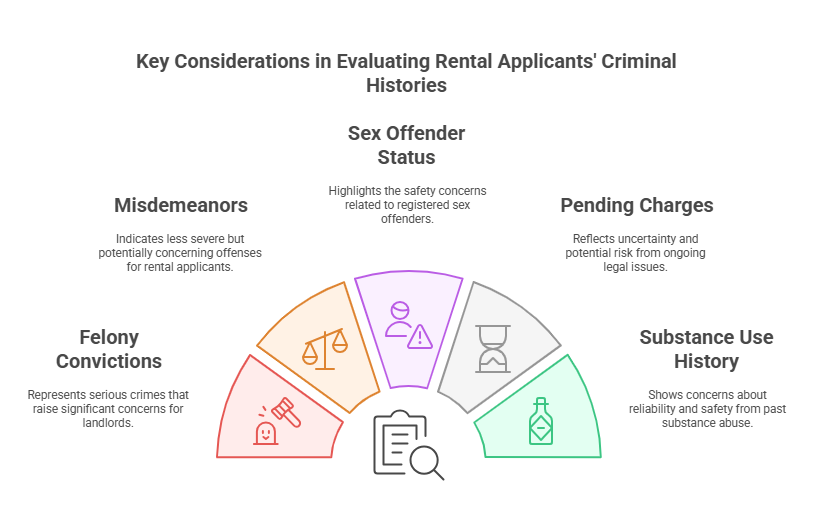
When performing a criminal background check for apartment rental, landlords typically examine several key factors to gauge the applicant’s history. These factors help assess whether the applicant poses any risk to the property or to other tenants:
- Felony Convictions: Felony convictions are often the most concerning factor for landlords. Felonies may include serious crimes such as assault, robbery, and drug trafficking. These offenses can raise red flags for landlords who are concerned about safety.
- Misdemeanors: Misdemeanors are less severe than felonies but can still be a cause for concern. Common misdemeanors include theft, DUI (driving under the influence), and disturbing the peace. While misdemeanants are generally not as high-risk as felons, repeated offenses can be a concern.
- Sex Offender Status: Landlords may check if an applicant is registered as a sex offender, as this can affect the safety and comfort of other tenants. Many jurisdictions require landlords to inform tenants if someone in the building is a registered sex offender.
- Pending Criminal Charges: Some landlords may choose to check for pending criminal charges. An applicant with an ongoing legal case may present uncertainty, and landlords may want to wait for the case’s resolution before making a rental decision.
- History of Drug or Alcohol Use: Criminal background checks can also reveal prior offenses related to substance abuse. Landlords may be concerned if a tenant has a history of illegal drug use or alcohol-related offenses, as this may impact their ability to be a reliable tenant.
The Process for Conducting a Criminal Background Check for Apartment Rentals
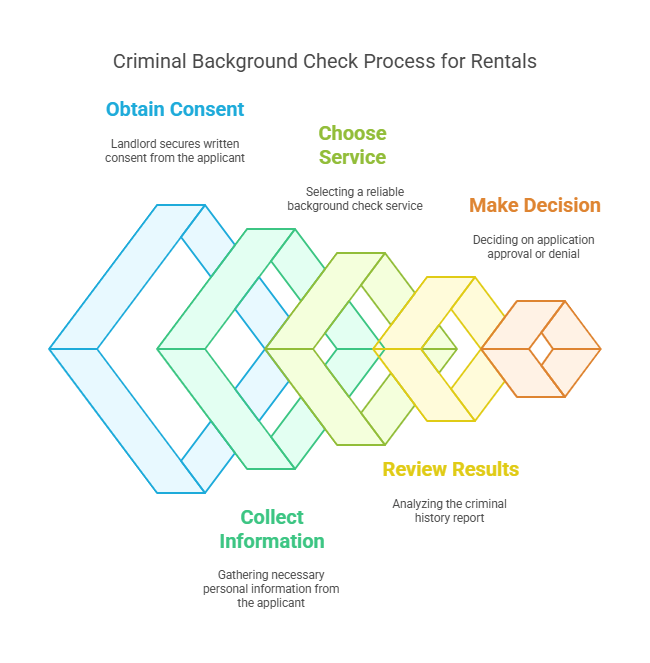
The process of conducting a criminal background check for apartment rentals generally follows these steps:
- Obtain Consent from the Applicant: Before running a criminal background check, landlords must get written consent from the applicant. This is a legal requirement to comply with privacy laws and fair housing regulations. The applicant should be fully informed about the process and the reasons for the background check.
- Collect Required Information: To run an accurate background check, landlords typically require the applicant’s full name, date of birth, Social Security number, and address history. This information helps the background check service find criminal records associated with the individual.
- Choose a Background Check Service: There are many third-party services available that specialize in running criminal background checks. Landlords can use these services to access nationwide or state-specific criminal records. It is important to choose a reputable service that provides accurate and up-to-date information.
- Review the Results: Once the background check is complete, the landlord should carefully review the results. This will include details such as any felonies, misdemeanors, or other criminal activities the applicant has been involved in. Landlords should evaluate the severity of the offenses, the time that has passed since the conviction, and other relevant factors.
- Make a Decision: Based on the results of the criminal background check, the landlord can decide whether to approve or deny the rental application. It’s important for landlords to keep their decisions consistent and fair, following legal requirements such as fair housing laws.
- Communicate with the Applicant: After making a decision, the landlord should notify the applicant in writing, explaining whether their application has been accepted or denied. If the decision is based on the criminal background check, the landlord should be prepared to provide the applicant with a copy of the background report, in compliance with the Fair Credit Reporting Act (FCRA).
Benefits of Conducting Criminal Background Checks for Apartment Rentals
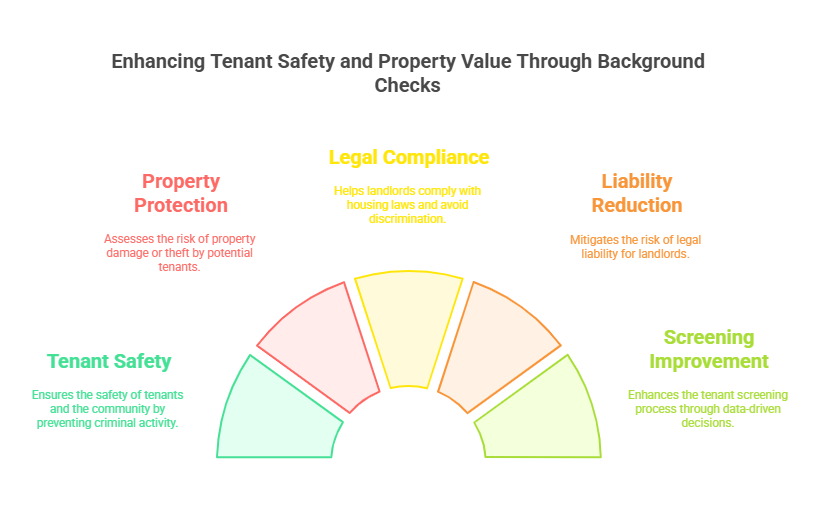
Conducting criminal background checks for apartment rentals offers a variety of benefits for landlords, property managers, and tenants. These checks not only help landlords make informed decisions but also foster a safe and secure living environment. Below are some of the key benefits:
1. Tenant Safety and Community Security
The most important benefit of conducting a criminal background check is ensuring the safety of other tenants and the broader community. By screening applicants for violent crimes, sexual offenses, or drug-related incidents, landlords can help prevent criminal activity from taking place within the property. This increases the overall sense of security for everyone living on the premises, which can lead to better tenant retention and a positive reputation for the landlord.
2. Protecting the Property
A criminal background check helps landlords assess the risk of property damage or theft. Tenants with a history of crimes related to property damage, theft, or vandalism may present a higher risk to the property’s integrity. By identifying such risks, landlords can choose tenants who are less likely to cause damage, thereby reducing maintenance costs and protecting their investment.
3. Legal and Compliance Protection
Landlords who conduct thorough criminal background checks are more likely to comply with local, state, and federal regulations. Many states have laws that protect against discrimination in housing, and by using criminal background checks appropriately, landlords can avoid violating fair housing laws. Criminal background checks also help landlords follow the Fair Housing Act, ensuring they treat all applicants equally and without bias.
4. Reduced Risk of Liability
By performing a criminal background check, landlords can mitigate the risk of liability. For example, if a landlord rents to a tenant with a violent criminal history and that tenant harms someone on the property, the landlord could be held liable for not properly screening the tenant. Criminal background checks act as a precaution to protect landlords from potential lawsuits and legal claims.
5. Improved Screening Process
Criminal background checks provide landlords with more than just basic information on an applicant’s criminal history. These checks allow landlords to make data-driven decisions, comparing an applicant’s criminal background to their rental history, financial reliability, and other factors. This improves the overall tenant screening process, helping landlords select responsible individuals who are likely to pay rent on time and follow the rules.
Best Practices for Using Criminal Background Checks
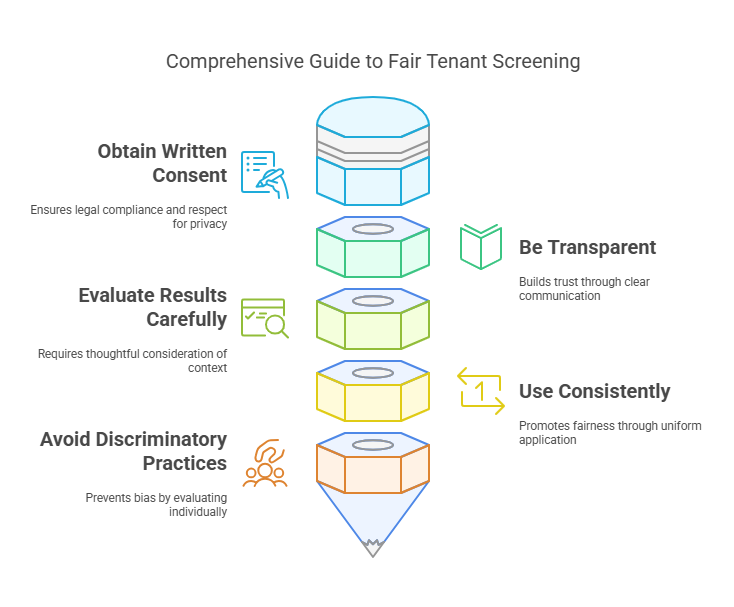
While criminal background checks are an essential tool for landlords, it is important to follow best practices when using them to ensure the process is fair, compliant, and effective. Below are some best practices to follow:
1. Obtain Written Consent from Applicants
Before running any background check, it is essential to obtain written consent from the applicant. The Fair Credit Reporting Act (FCRA) requires landlords to inform tenants of the background check and get their approval in writing. Without this consent, landlords risk violating privacy laws and could face legal consequences.
2. Be Transparent with Applicants
Be upfront with applicants about the background check process. Let them know that a criminal background check will be part of the screening process and explain what information will be reviewed. Transparency ensures that the applicant is aware of the steps involved and can address any concerns they may have upfront.
3. Evaluate the Results Carefully
When reviewing a criminal background check, landlords should consider not just the offenses listed but also the severity of the crimes, the date they occurred, and any other relevant context. For example, a tenant with a minor misdemeanor charge from several years ago may not pose the same risk as a tenant with a recent history of violent offenses.
4. Use Criminal Background Checks Consistently
Landlords should use criminal background checks for all applicants to ensure fairness and consistency in the screening process. Inconsistent use of background checks can lead to accusations of discrimination or unfair treatment, which can result in legal issues. Establish a clear, uniform policy for screening tenants and stick to it.
5. Avoid Discriminatory Practices
While landlords can use criminal background checks to screen tenants, they must ensure that they do not use the information in a discriminatory manner. According to the Fair Housing Act, landlords are prohibited from refusing housing based on race, color, religion, gender, national origin, disability, or familial status. Additionally, blanket policies that automatically reject applicants with criminal records may be seen as discriminatory if they disproportionately impact certain groups. Instead, landlords should evaluate criminal histories on a case-by-case basis.
ExactBackgroundChecks.com: How We Help Landlords with Tenant Background Checks
At ExactBackgroundChecks.com, we understand the importance of making informed decisions when renting to potential tenants. Our services provide landlords with reliable and thorough criminal background checks that help ensure tenant safety and property protection. Here’s how we can assist you:
Comprehensive Criminal Background Checks
We offer nationwide and state-specific criminal background checks that can help you evaluate whether a potential tenant poses any risks. Our reports include details on felonies, misdemeanors, sex offender status, and any other relevant criminal activities that may affect your decision.
Fast and Reliable Results
We understand that time is of the essence when renting properties. Our streamlined process ensures that you receive accurate background check results quickly, helping you make timely decisions regarding rental applications.
Compliance and Risk Mitigation
Our services comply with all applicable laws, including the Fair Credit Reporting Act (FCRA) and Fair Housing Act. We provide detailed reports that allow you to evaluate applicants without violating legal guidelines or exposing your business to potential liability.
Customization for Your Needs
Whether you manage a single property or an entire portfolio, we can customize our services to meet your specific needs. We provide tools that allow you to review applicant backgrounds with ease and make consistent, fair decisions for your rentals.
By choosing ExactBackgroundChecks.com, landlords can reduce risks, improve the tenant screening process, and protect their properties from potential criminal activity.
Legal Considerations for Criminal Background Checks for Apartment Rentals
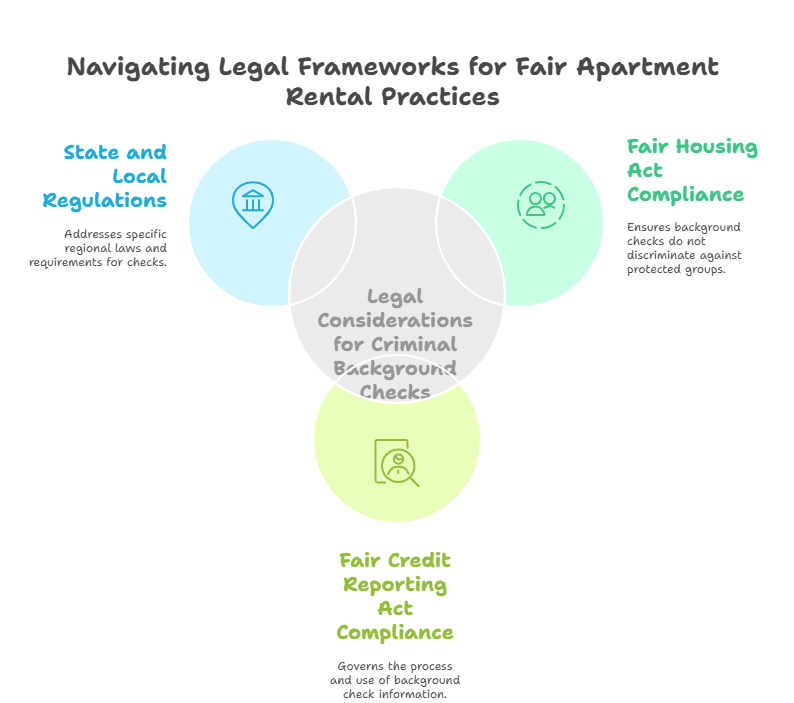
When conducting criminal background checks for apartment rentals, landlords must ensure they are complying with federal, state, and local laws to avoid legal pitfalls and potential lawsuits. Below are some of the most important legal considerations:
1. Fair Housing Act Compliance
The Fair Housing Act (FHA) prohibits landlords from discriminating against applicants based on certain protected characteristics, including race, color, religion, gender, national origin, familial status, and disability. However, criminal background checks can also be seen through the lens of discrimination if they disproportionately affect certain protected groups. Landlords must be cautious not to have blanket policies that automatically reject applicants with criminal records, as this may result in claims of racial discrimination, especially if the criminal justice system disproportionately impacts certain racial groups.
The U.S. Department of Housing and Urban Development (HUD) has issued guidelines on how landlords should evaluate criminal records. The HUD guidelines suggest that landlords should consider the nature of the offense, the time elapsed since the offense, and the applicant’s rehabilitation efforts. A blanket “no criminal record” policy may be deemed discriminatory, and landlords are encouraged to assess each case individually.
2. Fair Credit Reporting Act (FCRA) Compliance
The Fair Credit Reporting Act (FCRA) governs how background checks are conducted and how the information gathered can be used. Under the FCRA, landlords must:
- Obtain written consent from the applicant before running a criminal background check.
- Provide a copy of the background check to the applicant if the results lead to an adverse action (i.e., denying the rental application).
- Inform the applicant of their right to dispute the information if it is inaccurate.
Failure to comply with the FCRA can lead to penalties, fines, and legal action, so it is essential for landlords to follow the proper procedures when obtaining and using criminal background checks.
3. State and Local Regulations
In addition to federal regulations, landlords must be aware of state-specific and local laws governing criminal background checks. Some states or cities may have laws that limit how far back criminal background checks can go or that require landlords to evaluate the applicant’s rehabilitation efforts. For example, some jurisdictions prohibit the use of criminal records that date back more than a certain number of years, or they may require landlords to give applicants the opportunity to explain past criminal behavior before making a decision.
Before conducting criminal background checks, landlords should familiarize themselves with the laws in their state and locality to ensure compliance.
Frequently Asked Questions (FAQs) About Criminal Background Checks for Apartment Rentals
Can landlords reject a tenant based on a criminal background check?
Yes, landlords can reject tenants based on criminal history; however, the decision should be made carefully and consistently. Landlords are encouraged to assess the severity of the offense, how much time has passed since the crime, and any evidence of rehabilitation. Automatic denials for any criminal history can violate anti-discrimination laws.
How far back do criminal background checks for rentals go?
The duration a criminal background check covers depends on the state and the provider running the check. In many states, criminal background checks can go back as far as seven years. However, certain criminal offenses, such as felonies, may be reported indefinitely. It's important to consult with a background check service provider to understand the specifics of what is being reported.
What if the applicant has a criminal record but has shown evidence of rehabilitation?
Landlords are encouraged to consider applicants who have a criminal record but can show evidence of rehabilitation. Many states and local jurisdictions require landlords to evaluate the applicant's rehabilitation efforts, including factors like completion of rehabilitation programs, time passed since the offense, and the applicant's current lifestyle. In some cases, tenants with a criminal history may still be eligible for housing.
Are there any criminal offenses that automatically disqualify a tenant from renting an apartment?
Certain serious criminal offenses may automatically disqualify a tenant from renting an apartment, particularly violent crimes, sex offenses, or drug trafficking. However, landlords must still follow the law, considering each case individually and avoiding blanket policies that may be discriminatory. Always review the specific laws in your area to understand which offenses may or may not disqualify a tenant.
Can criminal background checks for apartment rentals be appealed by the applicant?
Yes, applicants who are denied rental based on criminal background checks have the right to dispute the information. If an applicant believes that the information in the background check is inaccurate, they can file a dispute with the credit reporting agency or service provider. Additionally, under the FCRA, landlords are required to notify applicants of any adverse actions taken due to background check results and provide a copy of the report.
Can landlords reject a tenant based on a criminal background check?
Yes, landlords can reject tenants based on criminal history; however, the decision should be made carefully and consistently. Landlords are encouraged to assess the severity of the offense, how much time has passed since the crime, and any evidence of rehabilitation. Automatic denials for any criminal history can violate anti-discrimination laws.
How far back do criminal background checks for rentals go?
The duration a criminal background check covers depends on the state and the provider running the check. In many states, criminal background checks can go back as far as seven years. However, certain criminal offenses, such as felonies, may be reported indefinitely. It's important to consult with a background check service provider to understand the specifics of what is being reported.
What if the applicant has a criminal record but has shown evidence of rehabilitation?
Landlords are encouraged to consider applicants who have a criminal record but can show evidence of rehabilitation. Many states and local jurisdictions require landlords to evaluate the applicant's rehabilitation efforts, including factors like completion of rehabilitation programs, time passed since the offense, and the applicant's current lifestyle. In some cases, tenants with a criminal history may still be eligible for housing.
Are there any criminal offenses that automatically disqualify a tenant from renting an apartment?
Certain serious criminal offenses may automatically disqualify a tenant from renting an apartment, particularly violent crimes, sex offenses, or drug trafficking. However, landlords must still follow the law, considering each case individually and avoiding blanket policies that may be discriminatory. Always review the specific laws in your area to understand which offenses may or may not disqualify a tenant.
Can criminal background checks for apartment rentals be appealed by the applicant?
Yes, applicants who are denied rental based on criminal background checks have the right to dispute the information. If an applicant believes that the information in the background check is inaccurate, they can file a dispute with the credit reporting agency or service provider. Additionally, under the FCRA, landlords are required to notify applicants of any adverse actions taken due to background check results and provide a copy of the report.
Conclusion: The Importance of Criminal Background Checks for Apartment Rentals
In conclusion, criminal background checks for apartment rentals are an essential part of the tenant screening process for landlords and property managers. By conducting thorough background checks, landlords can protect the safety of their tenants, safeguard their properties, and reduce their risk of legal complications.
However, it’s crucial that landlords comply with federal, state, and local regulations when conducting criminal background checks. This includes obtaining the applicant’s consent, following fair housing practices, and ensuring that background checks are not used in a discriminatory manner.
To ensure an efficient and compliant process, landlords can turn to services like ExactBackgroundChecks, which provide fast, reliable, and comprehensive criminal background checks for apartment rentals. These services make the screening process easier, help landlords make informed decisions, and ultimately contribute to the success and security of rental properties.
By following the best practices outlined in this article and using the right resources, landlords can create a safe, secure, and legally compliant rental environment for all parties involved.



